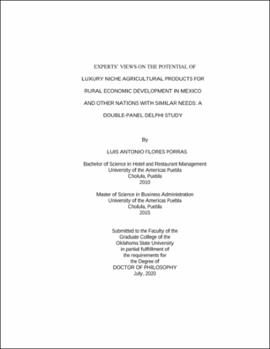| dc.contributor.advisor | Edwards, M. Craig | |
| dc.contributor.author | Flores Porras, Luis Antonio | |
| dc.date.accessioned | 2021-02-22T22:24:01Z | |
| dc.date.available | 2021-02-22T22:24:01Z | |
| dc.date.issued | 2020-07 | |
| dc.identifier.uri | https://hdl.handle.net/11244/328598 | |
| dc.description.abstract | Economic development in both rural and urban settings is essential if a nation is to realize growth and prosperity. Producing for luxury niche markets, such as cut flowers or certain food crops, may offer smallholder farmers unique entrepreneurial opportunities. Nevertheless, threats also may exist that should be considered before starting such ventures. This study sought to identify the potential of smallholder farmers in rural areas of Mexico, and other nations with similar economic development needs, to successfully grow specialty crops for luxury niche markets. More than 100 experts from the specialty crops industry were asked to participate as panelists in a double-panel, Delphi study; 34 accepted for a response rate of 30.8%, including researchers, extension educators, and other professionals, as well as producers. | |
| dc.description.abstract | The study involved three rounds of data collection to address six objectives. The first round consisted of three questions regarding 1) plant products, 2) a SWOT analysis framework, and 3) what smallholder farmers needed to achieve competitive advantages. In rounds two and three, the initial responses were returned successively for the panelists to rate using a Likert-type, response scale: 1 = Strongly disagree to 6 = Strongly agree. Items receiving 75% or more responses of either Agree or Strongly agree were determined to have reached consensus of agreement among the panelists. Extensive qualitative data was also gathered from both panels. | |
| dc.description.abstract | The panels reached consensus of agreement for 192 items after three rounds of data collection, including eight categories of plants and 100 specific examples. For the SWOT analysis framework, the researchers, extension educators, or other professionals panel reached consensus of agreement for nine Strengths, 21 Weaknesses, 15 Opportunities, and 13 Threats; and the producers panel achieved agreement for 13 Strengths, 20 Weaknesses, 16 Opportunities, and 10 Threats. The other items failed to reach consensus. It was concluded that potential existed for smallholder farmers and agribusinesses to produce select specialty crops for luxury niche markets, but both internal and external factors should be considered before instigating such ventures. Recommendations for future research and practice are offered as well as the study's contributions to related literature, practice, and research. | |
| dc.format | application/pdf | |
| dc.language | en_US | |
| dc.rights | Copyright is held by the author who has granted the Oklahoma State University Library the non-exclusive right to share this material in its institutional repository. Contact Digital Library Services at lib-dls@okstate.edu or 405-744-9161 for the permission policy on the use, reproduction or distribution of this material. | |
| dc.title | Experts' views on the potential of luxury niche agricultural products for rural economic development in Mexico and other nations with similar needs: A double-panel Delphi study | |
| dc.contributor.committeeMember | Robinson, Shane | |
| dc.contributor.committeeMember | Sallee, Jeff | |
| dc.contributor.committeeMember | Schnelle, Michael | |
| dc.contributor.committeeMember | Watters, Craig | |
| osu.filename | Flores_okstate_0664D_16844.pdf | |
| osu.accesstype | Open Access | |
| dc.type.genre | Dissertation | |
| dc.type.material | Text | |
| dc.subject.keywords | economic development | |
| dc.subject.keywords | human capital | |
| dc.subject.keywords | luxury markets and specialty crops | |
| dc.subject.keywords | niche market | |
| dc.subject.keywords | poverty and entrepreneurship | |
| dc.subject.keywords | strategic planning | |
| thesis.degree.discipline | Agricultural Education | |
| thesis.degree.grantor | Oklahoma State University | |
